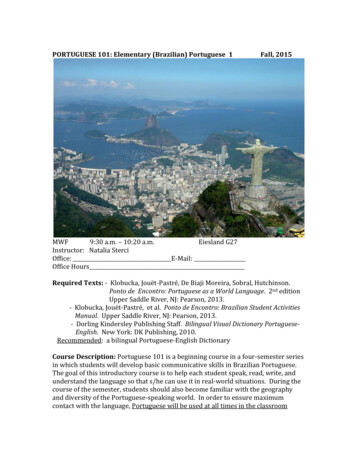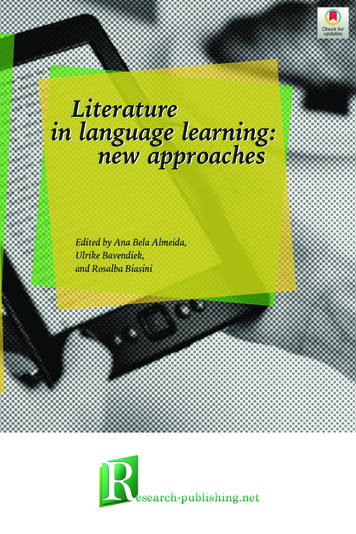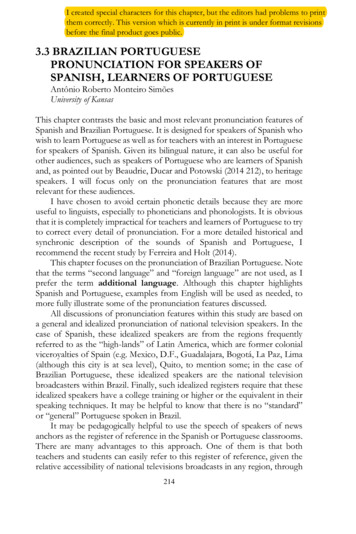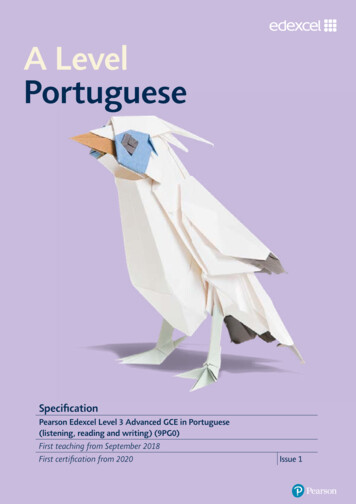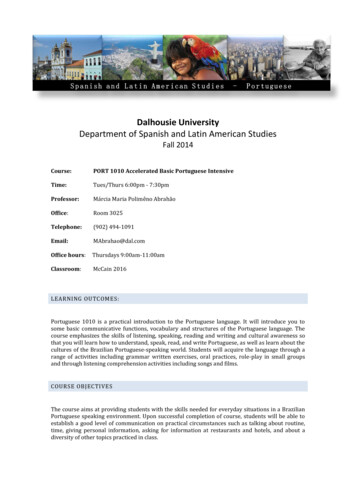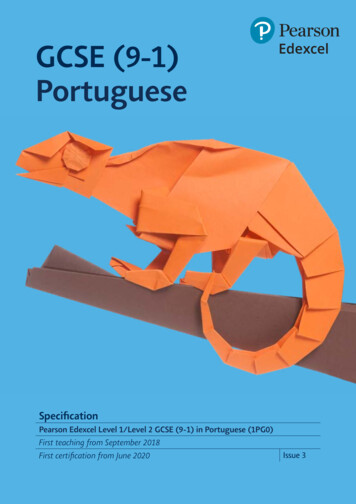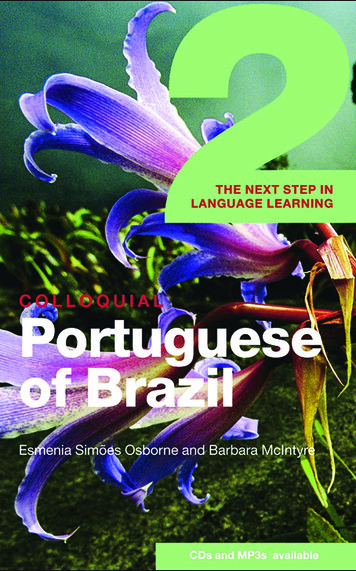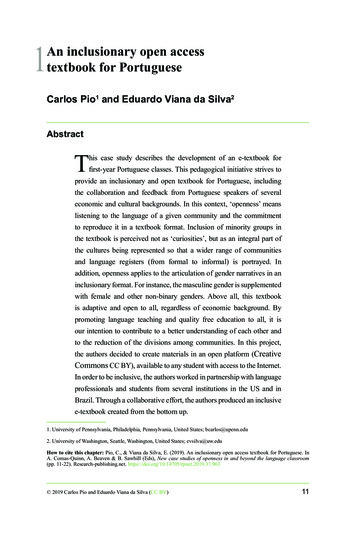
Transcription
BROWN UNIVERSITYDEPARTMENTOFPORTUGUESEAND BRAZILIAN STUDIESA HANDBOOK FORGRADUATE STUDENTS2021-2022
THE DEPARTMENT OFPORTUGUESE AND BRAZILIAN STUDIESMeiklejohn House(159 George Street)Box O - Brown UniversityProvidence, Rhode Island 02912Tel. (401) 863-3042Fax (401) 863-7261Leila Lehnen, ChairJoel Revill, Interim ChairLuiz F. Valente, Director of Graduate StudiesThe Department of Portuguese and Brazilian Studies offers interdisciplinary degreeprograms, ranging from the bachelor's to the doctoral level, which place emphasis uponlanguage, literature, history and the social sciences. The Department's programs focus on theglobal nature of the Portuguese-speaking world, as well as on specific geographical areas:Continental and Insular Portugal, Brazil, Lusophone Africa and Luso-America. Bothundergraduate and graduate students are able to work with a distinguished faculty equallycommitted to research and teaching, and to take advantage of the extensive resources on thePortuguese-speaking world at the Rockefeller, John Hay and John Carter Brown libraries.Besides offering academic programs in Portuguese language, Portuguese and BrazilianLiterature, History and Culture, the Department of Portuguese and Brazilian Studies extends itsresources beyond the immediate university community by organizing a varied program ofcultural events, including lectures, concerts and symposia. Exchanges with Brazilian andPortuguese universities, and the publication of books and five scholarly journals exemplify theDepartment's broader social and educational contributions.For more information, please visit the homepage of the Department of Portuguese andBrazilian Studies at: http://www.brown.edu/ academics/portuguese-brazilian-studies/1
FACULTY AND STAFFOnésimo T. Almeida, Professor and Director of the Undergraduate Honors Program(Cultural and Intellectual History, and Azorean Studies)Pedro Lopes de Almeida, Dean’s Faculty Fellow (Portuguese and Brazilian Literature)James N. Green, Professor (Brazilian History)Jeremy Lehnen, Lecturer (Brazilian/Latin American Film and GenderStudies, Language Studies)Leila Lehnen, Associate Professor and Chair (Brazilian and Latin American Literature)João Pedro Monteiro, FLAD Visiting Lecturer (History and Political Science)Gabriel Rocha, Vasco da Gama Assistant Professor (Early Modern History and Portuguese andBrazilian Studies)Patricia I. Sobral, Distinguished Senior Lecturer and Director of Undergraduate Studies(Portuguese Language and Brazilian Literature and Culture)Sérgio G. Sousa, Visiting Associate Professor (Portuguese Literature and Film)Luiz F. Valente, Professor (Brazilian and Comparative Literature) and Director of GraduateStudiesAffiliated FacultyGeri Augusto, Visiting Associate Professor (Africana Studies and International Studies)Joshua Tucker, Associate Professor (Brazilian Music)Leah VanWey, Professor (Sociology and Environment Studies)Emeriti FacultyLeonor Simas-Almeida, Distinguished Senior Lecturer Emerita(Portuguese and Luso-African Literature)Nelson H. Vieira, Professor Emeritus(Portuguese and Brazilian Literature and Judaic Studies)2
Graduate Teaching Fellows / AssistantsKevin W. EnnisJoyce FernandesAndressa Macena MaiaAlexsandro MenezTorin SpanglerSupport StaffArmanda Silva, Academic Department ManagerJenny Currier, Publications and Program Coordinator3
GRADUATE PROGRAMS INPORTUGUESE AND BRAZILIAN STUDIESLuiz F. Valente, Director of Graduate StudiesThe Department of Portuguese and Brazilian Studies offers two graduate degree programs: aDoctoral of Philosophy in Portuguese and Brazilian Studies and a Master's in Portuguese andBrazilian Studies.DOCTOR OF PHILOSOPHY IN PORTUGUESE AND BRAZILIAN STUDIESThe Ph.D. Program in Portuguese and Brazilian is advanced graduate study in the language,literatures and cultures of the Portuguese-Speaking World, with concentration on one or more ofthe following areas: Continental and Insular Portugal, Brazil, Lusophone Africa, and LusoAmerica. Students enrolled in this program are able to take advantage of the diverse expertise ofthe Department's faculty, which embraces specializations in Literature, Language, Philosophy,Comparative Literature, and History. It is the Department's philosophy that all students shouldgrasp the global nature of the Portuguese-Speaking World and study its language, literatures, andcultures as well as apply the tools of research and scholarship to their individual programs ofstudy. While this doctoral program will allow for an interdisciplinary component, the emphasisof the core program will be in the Portuguese language and Lusophone (African, Brazilian,Portuguese) literature and culture.The standard route to the Ph.D. is the successful completion of sixteen courses, a generalexamination (second year), a major paper and a book review (third year), a pre-dissertationcolloquium, and a dissertation.Specific Requirements for the Doctoral ProgramCoursework: The Department recognizes that doctoral students in Portuguese and BrazilianStudies have varied interests and therefore it encourages each student to construct his or herindividualized program in consultation with the Director of Graduate Studies. Nevertheless, theDepartment also finds it necessary to provide students with guidance regarding our overallexpectations for course load and distribution across the various regions of the Portuguesespeaking world and different historical periods:1. Students will complete a minimum of sixteen courses, one of which may be an independentstudy. Exceptions need to be approved by the voting faculty.2. First-year students who are the recipients of fellowships must enroll in four courses eachsemester and must take a language pedagogy course during their first year, such as CLS 2900Pedagogy or an equivalent. Second-year students should normally enroll in three courses eachsemester. In consultation with the DGS, third-year students will choose the pattern of coursesthat best suits their completion of the department's course requirements in conjunction with thewriting of their major paper and of a book review.4
3. Students will complete a minimum of six graduate seminars in Portuguese and BrazilianStudies (POBS 2000 courses). These seminars may not be replaced by independent studies.4. At least fourteen of the minimum sixteen courses should be taught by members of thePortuguese and Brazilian Studies faculty, including courses with primary listings in Portugueseand Brazilian Studies as well as in related departments such as Africana Studies, ComparativeLiterature, History, etc. that are cross-listed in Portuguese and Brazilian Studies.5. Although students will specialize in a particular area or period, courses should be distributedacross the various regions of the Portuguese-speaking world and different historical periods.6. In addition to courses on modernist and contemporary Brazilian and Portuguese literature,students will complete a minimum of two courses focusing entirely or in part on Brazilianliterature before 1900, a minimum of two courses focusing entirely or in part on Portugueseliterature before 1900, a minimum of one course focusing on Lusophone African literature, aminimum of one course on Brazilian History/Culture and a minimum of one course onPortuguese History/Culture.7. Students should understand that sixteen is only the minimum REQUIRED number of courses.Students are free to take or audit additional courses and to enroll in additional independentstudies both in Portuguese and Brazilian Studies and in other departments beyond the sixteencourse minimum.In selecting their courses, our doctoral students should give top priority to graduateseminars offered under the aegis of the Department of Portuguese and Brazilian Studies(2000 level). These seminars are designed specifically to fulfill the needs of our doctoral studentsby providing comprehensive coverage of the field over a three-year cycle. Appropriate 1000level courses may be selected in consultation with the Director of Graduate Studies as acomplement to the department's graduate seminars. Graduate students must secure approval fromthe Director of Graduate Studies for their program of courses prior to registration for eachsemester.8. Grades of INC (Incompletes): Graduate students may request grades of incomplete. Studentsshould be aware, however, that failure to complete courses on time can lower their standing inthe eyes of the faculty and graduate school, delay their progress toward the completion of thedegree and jeopardize their funding. Two or more incompletes will, at minimum, result in alowering of the students’ standing from good to satisfactory. The Faculty and/or Graduate Schoolmay delay approval of a teaching appointment or other funding until course work has beensatisfactorily completed. The student must fulfill the requirements for the completion of anincomplete according to the timeline agreed upon with the instructor. An instructor may allow astudent to complete course work after the normal deadline, but after one year, the permission of aDean is required for a grade to be given. If the student does not fulfill the requirements for thecompletion of an incomplete in the agreed-upon time, she/he may be placed on “WarningStatus.” For implications regarding “Warning Status,” please consult the Brown’s GraduateSchool Handbook.5
9. Doctoral students who have already acquired a Master’s Degree in Portuguese and BrazilianStudies or in a related field, at another institution, may obtain a transfer of credits that cannotaccount for more than the equivalent of one full year of graduate study (eight courses). Studentswho wish to transfer a year of credits will be expected to complete their milestones according tothe new timeline determined by the transferred credits. For example, the major paper and thebook review must be completed at the end of the second instead of the third year.10. Deviations from these guidelines should be requested in writing and require approval by theDepartment's voting faculty.General Examination: The general exams are taken over two days long, for three hours a day.Students answer three questions each day (one day in English and one day in Portuguese), for atotal of six questions. This is the last formal examination our doctoral students sit for. Studentsare expected to take this examination during their fourth semester in residence and no later thanMay 20.In answering the General Examination questions, students are expected to demonstrate not onlyfamiliarity with the works on the reading list but also an ability to apply analytical and criticalskills to literary and cultural texts.Exam results will be communicated to the graduate student in writing by the DGS. Students whodo not obtain a satisfactory result in up to two questions are expected to retake the examinationin the corresponding area/s by the end of his/her third semester in residence. If the student doesnot obtain a satisfactory result in more than two areas of the exam, he/she will be withdrawnfrom the program.Reading ListPortugalLírica Galaico-Portuguesa (Seleção de poemas)Fernão Lopes, Crónica de D. João IGil Vicente, Auto da Barca do InfernoLuís de Camões, Os LusíadasAntero de Quental, Sonetos (http://www.gutenberg.org/ebooks/20142 )Ana Plácido, Herança de LágrimasCamilo Castelo Branco, Amor de PerdiçãoEça de Queirós, Os MaiasFernando Pessoa, Seleção de Poemas (Poesia ortônima (including Mensagem) and theheteronymous poetry by Alberto Caeiro, Ricardo Reis and Álvaro de Campos)Vitorino Nemésio, Mau Tempo no CanalVergílio Ferreira, ApariçãoM. I. Barreno, T. Horta e M. V. Costa, Novas Cartas PortuguesasJosé Saramago, Memorial do Convento6
Lídia Jorge, A Costa dos MurmúriosAntónio Lobo Antunes, O Esplendor de PortugalHélia Correia, ContosSophia de Mello Breyner, Livro SextoAntónio Sérgio, Breve Interpretação da História de PortugalAfricaJosé Eduardo Agualusa, Nação CrioulaPepetela, A Geração da UtopiaMia Couto, Terra SonâmbulaPaulina Chiziane, NiketcheBaltazar Lopes, ChiquinhoOrlanda Amarilis, O Campo da PalavraAbdulai Sila, A Última TragédiaLuís Cardoso, Crónica de uma TravessiaPatrick Chabal, A History of Postcolonial Lusophone AfricaAntologia de Poesia de Mulheres AfricanasAmílcar Cabral, Textos políticosBrazilSérgio Buarque de Holanda, Raízes do BrasilGilberto Freyre, Casa-Grande & SenzalaAlfredo Bosi, Dialética da ColonizaçãoThomas Skidmore, Black into White: Race and Nationality in Brazilian ThoughtPaulo Freire, Educação como Prática de LiberdadeMaria Firmina dos Reis, ÚrsulaJosé de Alencar, IracemaMachado de Assis, Dom CasmurroAluísio Azevedo, O CortiçoEuclides da Cunha, Os SertõesLima Barreto, Triste Fim de Policarpo QuaresmaMário de Andrade, MacunaímaRaquel de Queiroz, As Três MariasGraciliano Ramos, Vidas SecasCarlos Drummond de Andrade, Antologia PoéticaJoão Cabral de Melo Neto, Os Melhores PoemasClarice Lispector, A Paixão Segundo G.H.João Guimarães Rosa, Grande Sertão: VeredasConceição Evaristo, Ponciá VicêncioMilton Hatoum, Relato de um Certo OrienteAna Maria Gonçalves, Um Defeito de Cor7
Sample Questions from Past General Examinations:(1) Os Lusíadas, de Luis de Camões, e a Mensagem, de Fernando Pessoa, têm sido várias vezesobjecto de comparação. Ao que parece, o próprio Fernando Pessoas tinha em mente a epopéianacional portuguesa quando criou a Mensagem. Faça uma análise comparativa e crítica das duasobras.(2) Um dos temas fundamentais da história intelectual e da literatura brasileiras desde meados doséculo XIX é a excepcionalidade do caráter nacional brasileiro, isto é, a ideia de que o brasileiroe suas produções culturais possuem algo de singular em relação a outras culturas e outras nações.Discuta as variações desse tema em quatro seguintes livros:Iracema, Os Sertões, Macunaíma, Raízes do Brasil. Casa Grande e Senzala e Formação daLiteratura Brasileira.(3) Basing your response on your own reading of the Camonean epic, comment on the followingstatements made by Silvério Augusto Benedito in his “Introdução” to Os Lusíadas:“Os Lusíadas são um vasto rio para onde confluem e onde se tornam caudal váriosaspectos da história viva de Quinhentos: o ideal épico português, a vida culturalrenascentista, o real das Descobertas, o ideal da Cristandade, a conflitualidade existencialdo poeta ( . )”(4) Discuss the following quote by Graça Aranha and relate its emphasis on subjectivity to thenarrative construction of what Antonio Candido calls “self and society” in such works as Pertodo Coração Selvagem e Grande Sertão: Veredas. In other words, how are the narratives of theseworks so designed as to underscore the representation of subjectivity?“A arte no Brasil não é a representação da realidade, o espelho divino da vida. É arepresentação da subjetividade do espírito humano.” [A Éstética da Vida, 1921]Major Paper and Book ReviewBefore advancing to candidacy students complete two exercises by no later than the sixthsemester, and possibly before. During the summer preceding their third year and continuing intothe fall of their third-year students work with a committee of three faculty members, chosen inconsultation with the Director of Graduate Studies, to complete an article of publishable qualityand a book review. The article does not have to be accepted for publication but must be deemedpublishable by the committee and submitted by the student to a peer-reviewed journal in the USor abroad. The article might be based on work previously submitted for a course or spin off froma paper presented at a professional conference. Any article published before the student starteddoctoral work at Brown will not be considered towards fulfilling this requirement. Students willalso prepare a book review under the guidance of a faculty member with the goal of having itpublished in an academic journal approved by the department.Consideration will be given to the possibility that the article might be replaced by a contributionto the profession in the area of the digital humanities, or by a substantial literary translation(book length). In order for such projects to be considered, the student must submit a petition witha rationale for the project that will be reviewed and voted by the faculty.8
Upon completion of the major paper and the book review, students qualify for a transitionalMaster of Arts degree (see page 19).Pre-Dissertation Colloquium: A public oral presentation and discussion of the student’sdissertation proposal, open to all faculty and graduate students in the Department, normally to begiven within the semester following the completion of the major paper and the book review(seventh semester). The colloquium consists of a twenty-to-thirty-minute presentation by thecandidate followed by a discussion with the members of the dissertation committee (see belowunder “Dissertation”). Copies of the proposal will be made available to interested facultymembers and graduate students at least one week before the scheduled date for the colloquium.The colloquium should occur by the end of the seventh semester.Funding for the 5 year in the form of a dissertation fellowship is contingent on the studenthaving successfully presented her/his pre-dissertation colloquium no later than her/his 7semester. In the case that the candidate would like to postpone her/his predissertation colloquium, she/he must submit a petition detailing the reason for the postponementto the faculty of the department of Portuguese and Brazilian studies before the end of their eighthsemester and must include a timeline for the completion of the pre-dissertation colloquium. Theproposed postponement will be brought to the full voting faculty for consideration.ththThe dissertation proposal consists of the following components:(1) Introduction: Overview of main ideas, hypotheses, objectives, and themes.(2) Contexts: (a) Theoretical considerations; (b) Comparative or historical/literary treatments ofthis theme/topic in the context of the Portuguese-speaking world; (c) Research sites and/orarchives if applicable.(3). Narrative (10-15 pages): Specifics about the development of the dissertation with a tentativeoutline of chapters and conclusion; contents of the thesis regarding authors, corpus of texts,materials, and other relevant items; main arguments and relation of these to overall objective.(4). Working Bibliography (approximately 10 pages): Primary and secondary materials,including theory and relevant criticism on specific authors, texts, movements, etc.Students are encouraged to consult copies of previously accepted dissertation proposals, whichare available from the Director of Graduate Studies and kept in a folder in the graduate students’lounge (third floor).Following the successful defense of the colloquium paper, students are officially advanced todoctoral candidacy (ABD).Language Requirement: Ph.D. candidates will be expected to have achieved native or nearnative fluency in Portuguese. In addition, candidates should demonstrate reading ability in asecond foreign language, which normally will be French, Spanish, Italian or German.9
Teaching Requirement: Ph.D. candidates are expected to acquire sound pedagogical skills byparticipating in the department’s teaching-mentoring program.Participation in the Scholarly Life of the Department: The department sponsors a livelyprogram of lectures, symposia, conferences and occasional concerts, designed to enrich theexperience of our students and to complement our classes and seminars. Doctoral students areexpected to participate actively in the scholarly life of the department by attending and,whenever applicable, participating in the organization of such events.Co-curricular Activities: At the end of every year students shall submit a short report on the cocurricular activities in which they participated during that year. The report may include a paperor papers presented at professional conferences (which our students are strongly encouraged todo), publications, as well as attendance at lectures and other events sponsored by the Departmentof Portuguese and Brazilian Studies and/or related departments.Dissertation: The dissertation is expected to make an original contribution to the field ofLusophone Studies, consistent with the high research and scholarship standards of theDepartment. The dissertation may be written in English or in Portuguese and should be normallyat least 200 pages in length in accordance with the graduate school’s formatting guidelines. Thefinal copy of the dissertation must strictly follow the guidelines issued by the Graduate School.For complete information about the rules for the preparation and submission of the final copy ofthe dissertation, please visit the Graduate School .The dissertation committee consists of three or more faculty members, at least two of whommust hold appointments in the Department of Portuguese and Brazilian Studies, to be chosen bythe student in consultation with the Director of Graduate Studies. The chair of the dissertationcommittee must be a faculty member in Portuguese and Brazilian Studies with particularexpertise in the area of the dissertation.The dissertation defense, scheduled at the convenience of the readers, is open to all members ofthe university community. The department’s faculty and graduate students in residence areexpected to attend. It consists of a twenty-to-thirty-minute presentation by the candidate,followed by a discussion with the members of the candidate’s dissertation committee. A finaldraft of the dissertation, except for minor corrections and revisions, must be submitted to the fullcommittee at least two weeks before the scheduled date for the defense.For students who intend to receive their degrees at Commencement, the deadline for thesubmission of the Ph.D. dissertation to the Department is April 15, thereby allowing enough timefor the defense and the filing of the final version with the Graduate School by the first businessday in May.10
Portuguese and Brazilian Studies Internal Deadlines for Graduate StudentsFall DeadlinesStudents planning on presenting the colloquium or defending their dissertation in the fall must doso by the end of the final exam week in December.Spring DeadlinesStudents planning on presenting the colloquium or defending their dissertation in the spring mustdo so by the end of the fourth week in May.Petitions for exceptions must be submitted in writing for review by the faculty of the department.The petition should include an alternate exam/colloquium/dissertation defense date andjustification/rationale for postponement.For graduate school deadlines, including deadlines to submit theses and dissertations andfellowship deadlines, please consult the Graduate School portant-dates-deadlines-studentsThe Sequence of the Ph.D. Candidacy ProcessBased on the requirements described above, the expected route toward the Ph.D. normallyfollows this pattern of landmarks:1 year landmarks: Eight courses and preparation for the general examination based on aset list of books on Luso-Afro-Brazilian literature, history and culture.st2 year landmarks: Completion of the general examination at the end of the academicyear (no later than May 20 ), six courses, and assignment as teaching assistant or proctor.ndth3 year landmarks: Final two courses, completion of a major paper and a book review,and assignment as teaching assistant, teaching fellow or proctor.rd4 year landmarks: Presentation of the pre-dissertation colloquium, application for adissertation fellowship, research for dissertation, and assignment as teaching assistant,teaching fellow or proctor.th5 and 6 year landmarks: Completion and defense of the dissertation. During the fifthyear students will normally hold a dissertation fellowship. Support for the sixth year willgenerally be in the form of a teaching assistantship or fellowship. (See below under“Financial Assistance and Assignments of Teaching Assistants, Teaching Fellows andProctors).thth11
The Mentoring Program: Research and Pedagogical SkillsOur Department is a community of individuals committed to the highest standards in teachingand scholarship in Portuguese and Brazilian Studies. Doctoral students are an integral part of thiscommunity. Working closely with supportive faculty members as mentors, doctoral students areencouraged to develop research and pedagogical skills that will prepare them for careers asoutstanding teachers and scholars. Besides regular meetings with the Director of GraduateStudies, doctoral students are urged to meet with other departmental faculty to discuss theirresearch and pedagogical interests.In addition to advice on the research and preparation of term papers, from early on in theirgraduate studies our doctoral students receive guidance on how to convert their course papersinto conference presentations and/or journal articles. Doctoral students are also offered theopportunity to partner with faculty members in research projects, the design of undergraduatecourses, the planning of academic conferences and symposia, and the publication of our fivescholarly journals, Gávea-Brown, Brasil/Brazil e-journal of Portuguese History, Pessoa Pluraland Journal of Lusophone Studies.It is the Department’s philosophy that teaching and research go hand in hand and are mutuallyenriching. Our commitment to teaching is reflected in the multiple educational programs ofinstruction and teacher training supported by the Department and included as part of itscurricular offerings and as a service to the surrounding community. The Master’s program inCross-Cultural Education, co-sponsored by the Education Alliance, is a testimony to thispedagogical position and may serve as a methodological and material resource for our students.Furthermore, the emphasis on language in both our undergraduate and graduate programs restson our belief that the acquisition of a foreign/second language contributes to what PierreBourdieu calls the expansion of one’s cultural capital in a material, cultural, and symbolicsense. The conviction that language and culture are facets of the same process and cannot beseparated permeates all aspects of our graduate program –– courses, research, examinations, andextracurricular activities. Doctoral students emerge from our program with linguistic expertise aswell as mastery of foreign language pedagogy, in addition to sound research skills. Suchcombination has proven to be highly attractive to universities seeking junior faculty to fillpositions in foreign language, literature and cultural studies, as attested by our very successfulrecord in placing the graduates from our Ph.D. program.Our doctoral students participate in a mentoring program designed to pass the Department’spedagogical legacy in foreign language, literature and culture on to them while enhancing theirteaching skills. According to our longstanding practice, from the very beginning we impart to ourdoctoral students the belief that immersion in and constant use of Portuguese as the targetlanguage, following the principles of a communicative and natural approach, represent crucialsteps in the acquisition of a second/foreign language. Furthermore, through both orientation andhands-on experience, our doctoral students quickly learn that foreign/second languages are to beused as media of instruction and not as ends in themselves (such as the traditional objective ofsolely mastering grammar skills).The teaching mentoring program consists of a series of steps designed to acquaint our students12
with various pedagogical approaches and methodologies, while also exposing them to differentinstructional experiences and course formats:1. Intensive one-day group orientation before the start of each academic semester.2. In addition to the group orientation, there will be group and/or individual meetingsthroughout the semester between teaching assistants/fellows and the faculty member(s) in chargeof teacher training, as well as class visitations followed by a discussion between the graduatestudent and the evaluator. Doctoral students will receive guidance on how to plan lessons,develop a course syllabus, design and grade exams and assignments, etc.The following courses have been earmarked for the teaching-mentoring program:POBS 105: Accelerated Portuguese – This course serves as an accelerated introduction toPortuguese, one of the most widely spoken languages in the world. It is also an introduction tothe diverse cultures of Portuguese-speaking societies. Specifically, the course will look into theethnic, racial, social, and gender diversity in these cultures. Designed for students who have noprior knowledge of Portuguese, POBS 0105 meets five hours per week.POBS 280: Mapping Food, Eating Meaning, Making Community: A Welcome to theLusophone World - In this course we will explore the Lusophone world vis-à-vis the local,regional, and national culinary traditions of Brazil, Portugal, Luso-Africa, and Goa. Through abroad selection of cultural material (music, film, television series, short stories, poems, visual art,etc.) that either directly or indirectly dialogues with the theme of food and cuisine in theLusophone world, we will survey the many cultures of the Portuguese speaking diaspora.POBS 400: Writing and Speaking Portuguese – Designed to improve the student’s ability incontemporary spoken and written Portuguese, using such cultural items as short stories, plays,films, videos, newspaper and magazine articles, and popular music. Method: situational/naturalapproach.POBS 630: Topics in Portuguese-Speaking Cultures – Selected literary and cultural texts thatserve as vehicles for a deeper understanding of Portuguese-speaking societies. Literary materialsare taken from several genres and periods with special attention to contemporary writings. Othermedia such as film and music a
Portuguese and Brazilian Studies faculty, including courses with primary listings in Portuguese and Brazilian Studies as well as in related departments such as Africana Studies, Comparative Literature, History, etc. that are cross-listed in Portuguese and Brazilian Studies. 5. Although students will specialize in a particular area or period .


